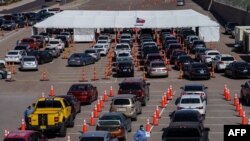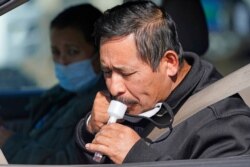The United States is in the middle of a dramatic surge in new COVID-19 cases, with more than 60,700 confirmed on Monday, according to data released by the Johns Hopkins Coronavirus Resource Center.
Sharp increases in infections were confirmed Monday in Illinois, Texas, Wisconsin, Tennessee and California, according to Hopkins data.
The number of new infections has pushed several cities and states to a crisis point, including the southwestern city of El Paso, Texas, where the number of coronavirus patients has reportedly tripled over the past three weeks.
The situation has become so dire in the border city that officials have imposed a strict 10 p.m. to 5 a.m. curfew and a two-week stay-at-home order. The judge who issued the curfew order said the intensive care units in all of the city's hospitals were full.
Texas Gov. Greg Abbott has unveiled plans to house between 50 and 100 patients in El Paso's convention center and has inquired about housing non-coronavirus patients at a U.S. Army hospital in the area.
In the western state of Utah, a group representing the state's hospitals has warned Gov. Gary Herbert that the facilities are reaching the point where they may have to start rationing care, where doctors would have to determine who could remain in the hospital based on factors such as age and overall health.
The more than 60,700 new infections reported Monday in the U.S. brings the total since February to over 8.7 million, the most in the world, according to Hopkins. The U.S. also leads the world in COVID-19 fatalities, with more than 225,700. Worldwide, there are over 43.6 million cases and more than 1.1 million deaths.
Experimental drug
U.S. government researchers say an experimental COVID-19 therapeutic drug is not effective at treating patients hospitalized with an advanced stage of the novel coronavirus.
The National Institute of Allergy and Infectious Diseases issued a statement Monday saying it would no longer recruit new patients to take part in a clinical trial of the experimental drug, bamlanivimab.
Developed by U.S.-based drugmaker Eli Lilly and Canadian-based biotech firm AbCellera, bamlanivimab is part of a class of treatments known as monoclonal antibodies, which act as immune cells that scientists hope can fight off the virus. The antibody therapy was similar to one given to U.S. President Donald Trump after he tested positive for COVID-19 in early October.
The clinical trial was paused earlier this month by independent monitors because of safety concerns. The study, which launched in August, aimed to enroll 10,000 hospitalized coronavirus patients in the United States.
Eli Lilly has already applied to the U.S. Food and Drug Administration for emergency authorization for the drug to be used for mild to moderate cases of COVID-19 based on preliminary results from a different clinical trial.
Global numbers
Russia, France, Sweden and Poland have also reported record numbers of infections in recent days.
Russia announced a nationwide face mask mandate Tuesday to contain the country's surge. Russia's health and consumer rights regulator said wearing masks is required in public spaces, on public transportation, in parking lots and in elevators. The regulator also limited the operating hours of entertainment venues.
In Italy's financial capital of Milan, young people angered over new lockdown measures clashed Monday night with police, as infections continue to surge in the country. Prime Minister Giuseppe Conte said Sunday the new measures were imposed to protect the economy and the health of citizens.
In Spain, doctors began a nationwide 24-hour strike Tuesday to protest what they say are poor working conditions and a weak health care system during the pandemic. But the impact of the strike, the first national walkout in the country in 25 years, was negligible because of a required minimum staffing level of 80%. Staffing level requirements of 100% are also required in many cases.
Wayne Lee and Richard Green contributed to this report.







